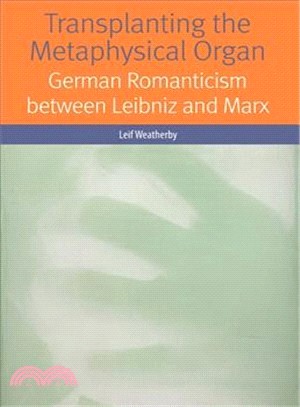Transplanting the Metaphysical Organ ─ German Romanticism Between Leibniz and Marx
商品資訊
系列名:Forms of Living (Fup)
ISBN13:9780823269419
出版社:Fordham Univ Pr
作者:Leif Weatherby
出版日:2016/03/01
裝訂/頁數:平裝/416頁
定價
:NT$ 2340 元無庫存,下單後進貨(到貨天數約30-45天)
下單可得紅利積點:70 點
商品簡介
作者簡介
相關商品
商品簡介
The German term das Organ comes ultimately from the Greek organon("tool"), but did not emerge in German-speaking Europe--to mean the functional part of a living being--until the1780s. The term remained caught between its ancient instrumental and modern biological senses well into the 19th century. Early German Romanticism (1796-1800) thus occurred in a small window of semantic confusion just before the naming of the discipline "biology" after 1800. Organs were not merely parts of animals, but also faculties of spirit and instruments of literary and literal production.Transplanting the Metaphysical Organ is the first book-length study to examine this terminological history and its literary and philosophical consequences.
Friedrich Holderlin, Friedrich Schelling, and Novalis shared the project of determining what sort of knowledge can count as metaphysical in a world filled with antinomies created by political and technological upheavals over the course of the eighteenth century. A new metaphysics, they reasoned, would need a determinate tool. Aristotelian scholasticism had long described logic a set of tools for philosophy, an organon. The organon's etymological sibling, the organ, had a primarily physiological heritage (sense-organ, internal organ). Combining the medical sense of the term (from Albrecht von Haller and Johann Wilhelm Ritter) with the logical senses (from Aristotle, Francis Bacon, Johann Heinrich Lambert, and Immanuel Kant) of these related terms, the Romantics imagined their literary-philosophical efforts as the construction an "organ of metaphysics."
This terminological history is missing from the intellectual historiography of the period, especially in the important works of Hans Blumenberg and Michel Foucault. Building on the work of Frederick Beiser and Manfred Frank,Transplanting the Metaphysical Organ shows how the Romantic synthesis of science and philosophy led to the invention of a modern metaphysics.
Friedrich Holderlin, Friedrich Schelling, and Novalis shared the project of determining what sort of knowledge can count as metaphysical in a world filled with antinomies created by political and technological upheavals over the course of the eighteenth century. A new metaphysics, they reasoned, would need a determinate tool. Aristotelian scholasticism had long described logic a set of tools for philosophy, an organon. The organon's etymological sibling, the organ, had a primarily physiological heritage (sense-organ, internal organ). Combining the medical sense of the term (from Albrecht von Haller and Johann Wilhelm Ritter) with the logical senses (from Aristotle, Francis Bacon, Johann Heinrich Lambert, and Immanuel Kant) of these related terms, the Romantics imagined their literary-philosophical efforts as the construction an "organ of metaphysics."
This terminological history is missing from the intellectual historiography of the period, especially in the important works of Hans Blumenberg and Michel Foucault. Building on the work of Frederick Beiser and Manfred Frank,Transplanting the Metaphysical Organ shows how the Romantic synthesis of science and philosophy led to the invention of a modern metaphysics.
作者簡介
Leif Weatherby is Assistant Professor of German at New York University. His research interests include Romanticism and Idealism, the history of science and technology, and Marx and Marxism.
主題書展
更多
主題書展
更多書展今日66折
您曾經瀏覽過的商品
購物須知
外文書商品之書封,為出版社提供之樣本。實際出貨商品,以出版社所提供之現有版本為主。部份書籍,因出版社供應狀況特殊,匯率將依實際狀況做調整。
無庫存之商品,在您完成訂單程序之後,將以空運的方式為你下單調貨。為了縮短等待的時間,建議您將外文書與其他商品分開下單,以獲得最快的取貨速度,平均調貨時間為1~2個月。
為了保護您的權益,「三民網路書店」提供會員七日商品鑑賞期(收到商品為起始日)。
若要辦理退貨,請在商品鑑賞期內寄回,且商品必須是全新狀態與完整包裝(商品、附件、發票、隨貨贈品等)否則恕不接受退貨。
























